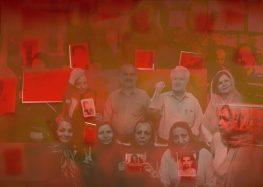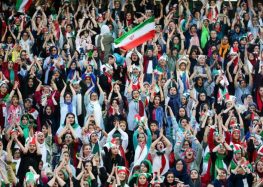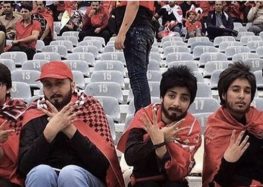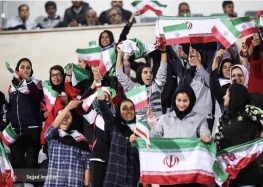Iranian VP for Women’s Affairs Calls Ban on Females in Sports Stadiums “Discrimination”
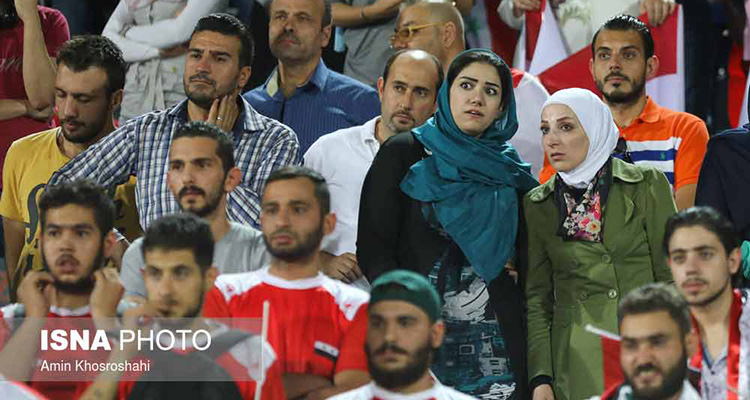
Three days after Iranian women were barred from entering a stadium in Tehran to watch an international soccer match, President Hassan Rouhani’s top female adviser described the ban as discriminatory.
Vice President for Women and Family Affairs Masoumeh Ebtekar was reacting to Syrian women being allowed inside Azadi Stadium during a World Cup qualifier match between Iran and Syria on September 5, while Iranian women, even those holding tickets, were banned from entry.
“In regards to the presence of women in sports arenas, I had a conversation with Sports Minister Mr. [Masoud] Soltanifar about the discrimination shown between Iranian and Syrian women at the football match,” said Ebtekar on September 8, 2017.
“Negotiations are underway with the police as well as cultural and executive authorities to hopefully resolve this matter and allow families to enter the arenas,” she added, suggesting that all women should be able to cheer in the stands as part of a family unit.
Photos of the crowd at the Iran-Syria match showing Syrian women supporting their team from inside the stadium while Iranian women were standing outside were widely condemned by Iranian social media users.
Some members of the Iranian parliament also publicly questioned the double standard.
“It is unbecoming for our country when Iranian girls and women are not permitted in arenas but foreign women are let in without any problem,” said reformist MP Fatemeh Zolghadr on September 6.
The leader of the women’s faction in parliament, Parvaneh Salahshouri, said she would not use her special privileges as an MP to watch a game in the stadium “as long as Iranian girls have to dress as boys and jump over a thousand other obstacles” to get inside sports arenas.
Some 200 Iranian women had purchased tickets for the Iran-Syria soccer game via the Iranian Football Federation’s website, but the federation later announced that females were only able to purchase tickets because of a “technical mistake.”
“There are no plans to allow women into the match between Iran and Syria,” said Mohammad Hosseini Hamisi, the federation’s security director, on September 4. “We strongly deny the rumors to the contrary.”
Women in Iran are not legally banned from entering stadiums to watch male athletic events, but the discriminatory practice—strongly supported by hardline religious conservatives—has been an unofficial policy of the Islamic Republic since the 1979 revolution.
In June 2016, the Center for Human Rights in Iran (CHRI) wrote a letter to President Rouhani urging him to use his authority to immediately repeal the ban on women’s attendance at sports stadiums and require Iranian authorities to issue instructions to security officials at the games, and to all other law enforcement bodies, to ensure that women and girls can safely attend the matches.
In April 2006, then President Mahmoud Ahmadinejad asked the Physical Education Organization to prepare the grounds for allowing women into sports arenas, but the plan stalled after hardline conservative religious factions voiced strong opposition.
Female fans and women’s rights activists continue to resist the ban by showing up at every international sport event in Iran to pressure the authorities to end the discriminatory practice.
In June 2014, Iranian-British citizen Ghoncheh Ghavami was arrested for attempting to attend a volleyball match at the Azadi Indoor Stadium of Tehran and sentenced to one year prison for “propaganda against the state” and other national security-related charges. She was released from prison in November 2014 after posting bail at one hundred million tomans ($35,155 USD).
In February 2015, 190 Iranian activists requested that the international soccer governing body, FIFA, suspend Iran’s membership in response to the ban on the presence of Iranian women in stadiums.
“We ask FIFA to suspend the membership of the Islamic Republic of Iran based on Article 3 of its Articles of Association, or at least, to follow the commended 2014 action of the Federation Internationale de Volleyball (FIVB) to ban Iran from hosting any competitions, and to prevent the Islamic Republic of Iran from holding any FIFA-organized sports events in Iran,” said the letter addressing FIFA chief Sepp Blatter.
The letter was signed by prominent Iranian activists including Nasrin Sotoudeh, Parastou Forouhar, Mohammad Maleki, and Nobel Peace laureate Shirin Ebadi.

